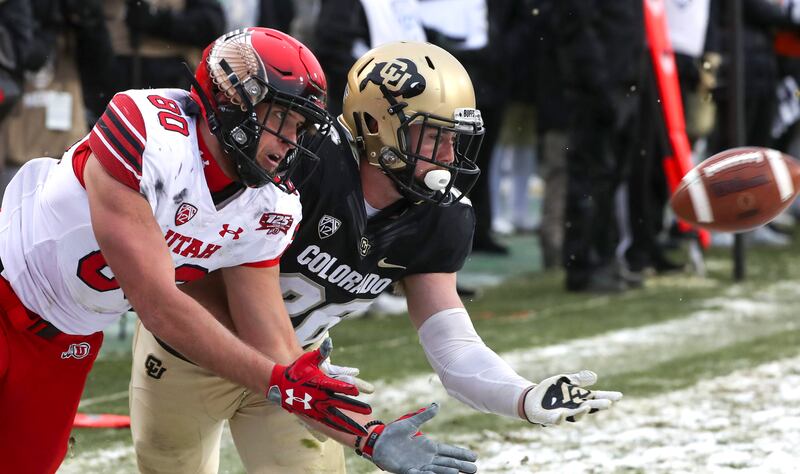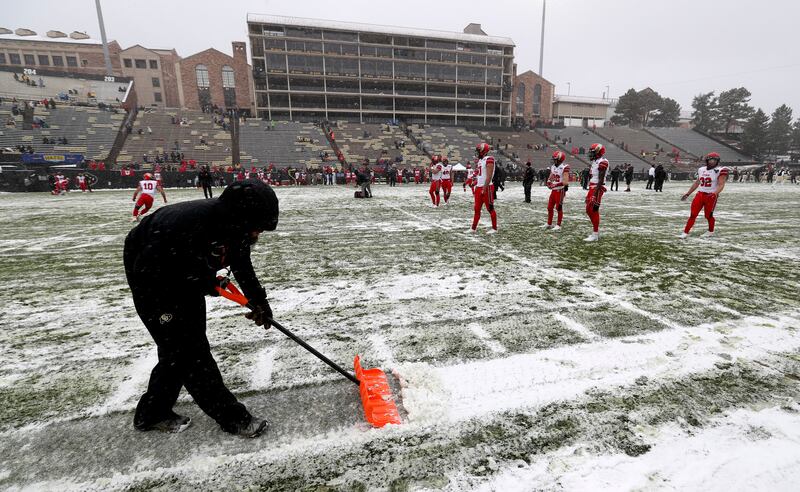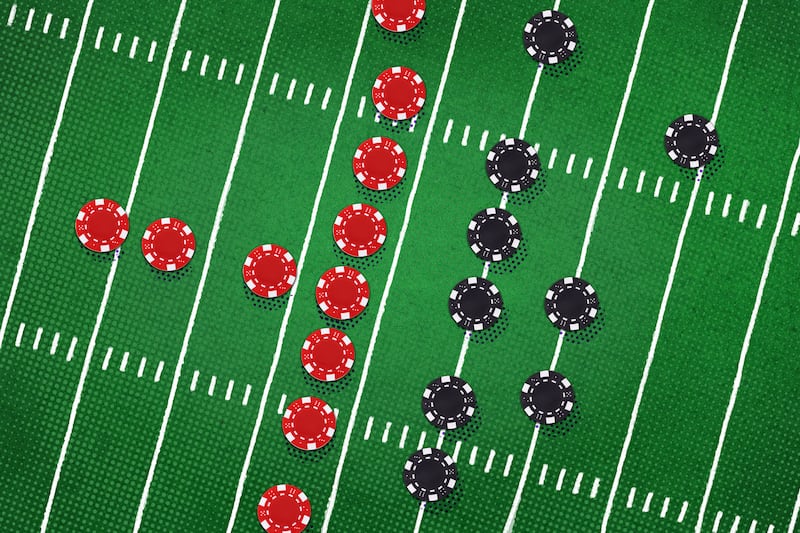When the Utah Utes face the Colorado Buffaloes this December in the so-called “Rumble in the Rockies,” keep an eye on the end zone LED display at Boulder’s Folsom Field. There, for at least four “highly TV visible” minutes each game, the Pac-12 university will promote an online bookmaker called PointsBet.
Or tune into the school’s radio broadcast, where for at least 10 seconds each game, the same company is guaranteed a 10-second “in-game live mention.” Perhaps it’ll sound like this: Britain Covey streaks down the sideline to set up a first-and-goal for the Utes. And speaking of big plays, you can play and win big with PointsBet. PointsBet will also get three 30-second commercials during every game broadcast, along with a slew of other perks.
The school agreed to those terms in a deal announced last month, though financial info and certain requirements were absent. The details were released on Oct. 3 by Sports Illustrated, which obtained a copy of the contract. PointsBet will pay Colorado $1.625 million over five years, plus $30 per customer who signs up to gamble using the school’s promo code. The deal is the first of this scale between a major public university and a gambling site.
“It is the most egregious, over-the-line effort I have ever seen,” said Frank Fear, a professor emeritus in the department of community sustainability at Michigan State. “Gambling has no place in higher education other than a subject we study and teach about.” The university’s mission statement, after all, promotes service, education, training, research and health — all seemingly antithetical to gambling.
Gambling watchdogs are concerned, too. “Any time you’re promoting a potentially addictive activity on campus to people, the majority of which are not of age, that’s a problem from an addiction responsibility standpoint,” said Keith Whyte, the executive director of the National Council on Problem Gambling. “And another problem is integrity. … An athlete with a gambling problem is at the highest risk for match fixing.”
But a decision like this doesn’t happen in a vacuum. The University of Colorado and its athletic department surely don’t want students and fans to develop a gambling problem. Why, then, would they bring a digital bookie to campus?

The deciding factor you’ve never heard of
You’ve probably never heard of Learfield IMG, but if you’re a fan of Utah, BYU or Utah State — or just about any major college sports program — you’ve almost certainly interacted with the company’s products. Commercials on radio broadcasts, game day program ads, stadium signage — they’re all regularly outsourced by athletic departments to Learfield IMG, which manages each program’s multimedia rights.
The arrangements are mutually beneficial and can take several forms. Learfield IMG might pay a school an upfront sum for its multimedia rights, then sell those rights up to a certain amount, before splitting any additional profits with the athletic department. Or the deal might feature revenue sharing from the beginning.

To understand Colorado’s deal with PointsBet, you must understand that the deal wasn’t entered into by the athletic department, but by Buffalo Sports Properties LLC — the school’s in-house Learfield IMG office. And the contract doesn’t pay the athletic department; it pays Buffalo Sports Properties LLC. The university’s only guarantee is found in Exhibit A, which says that $75,000 per year will be allocated “directly to supporting the development of CU student athletes and PointsBet recruitment.”
Beyond that, it’s unclear how much of the $1.625 million the university will ever see, or how much it’ll get from the $30 referrals. That’s because the athletic department’s compensation agreement with Learfield IMG is redacted in the public records published by The Intercollegiate.
“We don’t know whether it’s an upfront payment, or an ongoing royalty split, or a hybrid of an upfront payment and a royalty arrangement,” said Darren Heitner, a sports lawyer and founder of Heitner Legal, after reviewing the contracts. Todd Weinke, general manager of Buffalo Sports Properties, wrote in an email to the Deseret News that “I have no comment and nothing to add to the information previously shared.”
To make sense of the deal, one must also understand the context in which it was born.
After the Great Recession in 2008, explained Northern Colorado professor of education Derek Gottlieb, many states slashed education budgets, and those funds never returned, even as the economy recovered. Schools responded with tuition hikes. In Colorado, and six other states, tuition for four-year public institutions rose by 60% between 2010 and 2017. But tuition is not always enough; states often cap how much prices can be raised, and given the current student debt crisis, young people are more discerning than ever. “Money,” Gottlieb said, “is going to have to come from other sources.”
Which explains why he took to Twitter and heralded the deal as “the future of keeping higher education afloat.” In an interview, he explained: “Universities have been put in a terrible position where they either have to sell out to stay afloat,” he said, “or end up closing.”
Such an agreement wouldn’t have been possible, Heitner added, until 2018, when the Supreme Court struck down the Professional and Amateur Sports Protection Act. Passed in 1992, the law effectively outlawed sports betting nationwide (with a few exceptions). In Murphy v. NCAA, the Supreme Court overturned the law, ruling that it violated the 10th amendment. That opened the door for states to craft their own gambling regulations, and so far, 19 have legalized it, including Colorado.
The University of Colorado’s partnership with PointsBet, then, is in part due to simple convenience. Not only because of the recent change in law, but because PointsBet, an Australian company, recently opened its U.S. headquarters in nearby Denver. In a statement to the Deseret News, a company spokesperson said, “We are a technology company first and foremost — through this relationship, our main focus is to establish a recruiting pipeline into the University’s rich pool of tech talent, complementing our growth as we look to bolster our new Denver headquarters with some of Colorado’s best and brightest.”
At first glance, the partnership seems to conflict with the American Gaming Association’s Responsible Marketing Code for Sports Wagering, which says that sports betting shouldn’t be advertised on university campuses. But a statement provided by Casey Clark, the AGA’s senior vice president of strategic communications, said that the school’s agreement with PointsBet doesn’t conflict because the code covers only activity that promotes gambling itself; not a gambling brand.
“In fact,” the statement continues, “(the agreement) is aligned with the industry’s commitment to support our communities.” Clark also said the AGA had an early conversation with PointsBet about the agreement.
Whyte, the executive director of the National Council on Problem Gambling who highlighted potential pitfalls in the deal, added that PointsBet does have a “pretty good record” on responsible gambling. He defines that as policies and procedures put into place by gaming operators and state regulators to encourage informed choices and minimize lasting harm.
Colorado athletic director Rick George also touted PointsBet’s “commitment to raising awareness around responsible gaming,” thereby stamping the university’s imprimatur on the deal. Not that such approval was ever in doubt: The athletic department’s agreement with Learfield IMG stipulates that Learfield IMG “cannot make any commitment with sponsors … unless or until the University has approved such sponsor.”
Which leaves Fear, the Michigan State professor emeritus, asking himself, “Where is the president of the university? Where is the board? And … Where is (the $30 referral fee) in the context of a public institution?”
When students become the product
As the aftermath of the Great Recession is amplified by the pandemic, academics and university administrators stretched to their limits are unlikely to complain about this deal, Gottlieb said, and others to come. “They’re so desperate for money,” he said, “that they’re willing to do anything — even completely prostrate themselves.”
He predicts similar experiments will continue as universities’ funding continues to dry up. For example, as Colorado acknowledged in announcing the deal, it “provides a financial boost for CU athletics during a time when athletic department budgets nationwide are stressed by the COVID-19 pandemic.”
“The pandemic has exposed a lot of the perverse incentives that already exist on and around college campuses,” Gottlieb said, “that work actively against the idea of providing a well-rounded, intellectual experience for students.”
Indeed, higher education’s first major partnership with a gambling outlet is made possible by a system that increasingly must pursue money at the expense of its “social responsibility,” to quote Fear. “The larger storyline,” he added, “is what’s happening in higher education, particularly large public institutions.”
This particular deal reminds Gottlieb of social media business models. Platforms like Facebook, Instagram, Twitter and others are “free” only because they sell user information to advertisers; from the companies’ perspective, the users are the product. In this analogy, Colorado is the social media company, PointsBet is an advertiser, and the students are the ones being sold. “And the funny thing,” Gottlieb added, with a hint of darkness, “is that it’s not even free! You’re paying (tuition), and you’re the product!”


